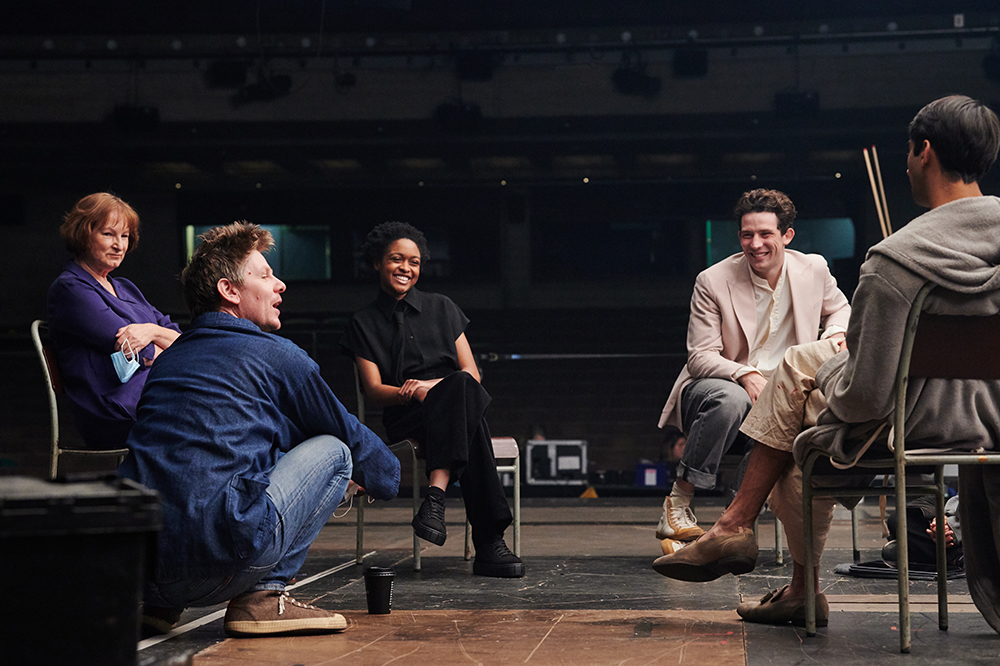Culture
 Deborah Findlay (Nurse), director Simon Godwin, Ella Dacres (Peta), Josh O’Connor (Romeo) + Shubham Saraf (Benvolio) on the set of "Romeo & Juliet" at the National Theatre. Photo by Rob Youngson.
Deborah Findlay (Nurse), director Simon Godwin, Ella Dacres (Peta), Josh O’Connor (Romeo) + Shubham Saraf (Benvolio) on the set of "Romeo & Juliet" at the National Theatre. Photo by Rob Youngson.
A Touch of Danger in Shakespeare Theatre Company’s “Romeo & Juliet”
April 9, 2021 @ 10:00am
It goes without saying that “Romeo & Juliet” is a classic play. If you didn’t read it in school, no doubt you’ve at least learned the story from one of its countless pop culture references (“Love Story” by Taylor Swift, anyone?) Beyond that, there is not a lot that seems relatable about two teenagers’ tragic love story, but in a pandemic where touching has become taboo, “Romeo & Juliet” has proven more relatable than ever.
“The fact that you couldn’t touch people [because of Covid] was actually, in a sense, a help for us because in the original play, this love is very dangerous,” says Simon Godwin, artistic director for Shakespeare Theatre Company (STC) in D.C. and an associate director for the National Theatre in London. “To be in a text in which touch was so potentially life-threatening meant that everything became a lot more intense. This obstacle also became the way, and that was kind of the mantra we used as we were making this.”
Starring Jessie Buckley (“I’m Thinking of Ending Things”) and Josh O’Connor (“The Crown”) in the title roles, the pandemic did more than just make touch an obstacle for this National Theatre London production. Last April, the members of the cast and crew learned that rehearsals for “Romeo & Juliet” would not be happening and the production would be put on hold until further notice. The sudden shuttering of the theater left Godwin reeling, he says.
However, not long after, there was talk of how the production could still take place, which led to the idea of turning the play into a film and broadcasting it on TV. Filmed on the National Theatre stage this past November, “Romeo & Juliet” will now have its U.S. premiere on April 23 on PBS as part of their “Great Performances” series.
While the production was filmed in its original home, the change from stage to screen did require some artistic changes, Godwin says.
With help from Buckley and O’Connor, “We began to think of this idea of ‘Maybe it is set in an empty theater, and then maybe as the story goes on, the world becomes more and more realized.’”
In this way, the conditions in which the production was made very much became a part of the concept. In addition to this artistic change, the original Shakespeare text was cut down to almost half its size to fit the play into a 90-minute film.
Godwin says it felt vital that to make “Romeo & Juliet” work as a film, it needed to be fast and intense. Filming would also allow the audience to be much closer to the actors, offering a more intimate feel than if they were being watched from a stage.
Other adjustments included combining a theatre and film crew, learning film lingo, and again, focusing on touch in an adaptation that often revolves around the yearning to be held. While creating the production during a pandemic proved challenging at times, it was also a useful distraction, Godwin says.
“[The play] was a useful thing to think about, as well as so many other things: the staff at the theater [and] how I could protect jobs and create Shakespeare Hour LIVE!, which is [STC’s] weekly Shakespeare show. In a way, it was a very dark time, but it was also a time of almost necessary creativity.”
This creativity is evident in the way the cast and crew have not only embraced the changes thrown at them, but used them to their advantage. Instead of hiding the fear and confusion felt by the team, it’s Godwin’s hope that those emotions brought on by the pandemic will bolster the atmosphere of the story.
“We were the only people working in the National Theatre by the end of the filming, so it was an abandoned stage [and] a closed building filled with ghosts of the past and hopes of the future. It meant we were all making [‘Romeo & Juliet’] in a much more intense way than we would have done normally. I hope that comes across.”
“Romeo & Juliet” premieres on PBS on Friday, April 23 at 9 p.m. EST. Learn more at www.nationaltheatre.org.uk/shows and www.shakespearetheatre.org. Follow STC on Instagram @shakespeareindc.
Enjoy this piece? Consider becoming a member for access to our premium digital content. Support local journalism and start your membership today.







